Poson : A spiritual passion
By Kalakeerthi EDWIN ARIYADASA
“Everything changes continually. What is
history, indeed, but a record of change. And if there had been very few
changes in the past, there would have been little of history to write.”
-
Pandit Jawaharlal Nehru
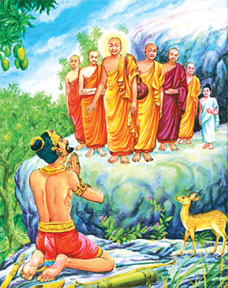
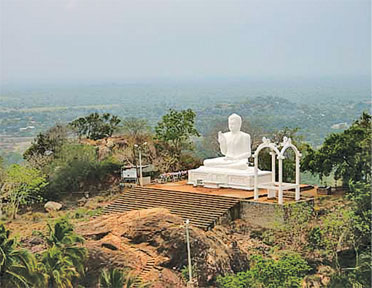 |
|
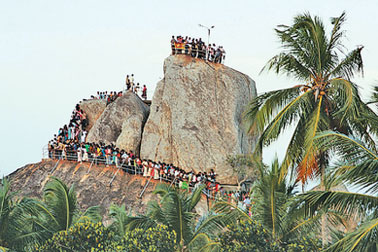
Crowds throng Mihintale during Poson |
Spiritual changes are at times so dramatic and swift, that they may
take place between “one breath and another”. However speedy such
spiritual shifts may be, their dynamic momentum propels history forward
for ages, transforming individuals, multitudes and whole cultural
systems writing human destiny in an entirely new idiom.
In our long and chequered history, spanning more than 25 centuries, a
sudden spiritual metamorphosis occurred, altering the total cultural
profile of our land - utterly and completely. This was on a Poson Full
Moon Day, about 2,255 years ago.
Focal point
The focal point of the far-reaching transformation of the soul of
this land, was, of course King Devanampiya Tissa - the then ruler of the
land. Leading the annual national spring holiday, the monarch took to
the chase, in the company of his hunting retinue. Armed with his bow and
arrows, he pursued the deer he had targeted. In the heat of the hunt, he
was relentlessly bent on getting his quarry - to the exclusion of
everything else.
But his evil concentration frayed. He stood still and looked around,
disturbed by someone calling him out, by his first name. He knew full
well that there was no one at all in his kingdom who would dare call out
to him by his first name Tissa.
Then he beheld, on the top of a boulder, in the royal mango grove, a
group of saffron-clad individuals. The leader of the mission addressed
the king and explained that they were bhikkhus - disciples of the Buddha
- The King of Righteousness - and have arrived here from Jambudipa
(India) in their compassion towards him.
From then on, the Poson story, narrating the formal introduction of
Buddhism to Sri Lanka has become an oft-repeated spiritual episode.
Arahant Mahinda tested the intellectual maturity of the king by the
first-ever IQ test administered in the history of this country. This was
as a prelude to the exposition of the essence of Buddhism to King
Devanampiya Tissa.
Weapons were discarded. The destructive bustle of the hunt subdued,
as the gentle, sonorous tones of Arahant Mahinda's sermon began to
pervade the landscape. The location Ambastala (mango mountain) yielded
to its new designation Mihintala (Mihindu Mountain).
From then on, Buddhism established itself as the central force that
determined the progress of this land - Dhammadipa (Isle of
Righteousness).
Intriguing issues
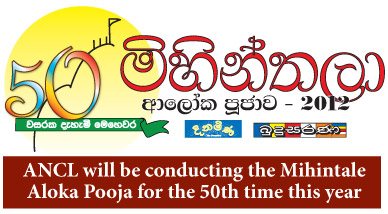 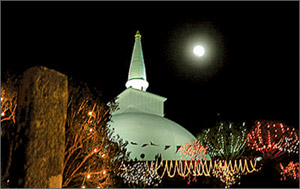 But, for me, the totality of the Poson record, chronicled by the
Mahawamsa, bristles with a series of intriguing issues, that demands
elucidation. But, for me, the totality of the Poson record, chronicled by the
Mahawamsa, bristles with a series of intriguing issues, that demands
elucidation.
How did this “unseen friendship” originate? Did King Devanampiya
Tissa accept the suzerainty of Dhammasoka, leading to the sending of
priceless treasures to him as gifts?
Why did Emperor Asoka confer the honorific “Devanampiya” on the ruler
of Sri Lanka?
What determined the request of the Emperor, that King Devanampiya
Tissa, should be consecrated a second time, under the Emperor's aegis?
When Emperor Asoka sent out Buddhist emissaries to various lands, he
singled out Sri Lanka, for exceptionally high privileges. While sending
various Theras to important lands such as Kashmir, Gandhara and Yona, he
sent his son Arahant Mahinda to Sri Lanka. Along with his son, the
Emperor sent his grandson - novice-monk Sumana - son of the Emperor's
daughter Sanghamitta. That was not all.
The lay-devotee Bhanduka who arrived with Arahant Mahinda, was the
son of a daughter of Devi's sister. (Devi was the Queen of Emperor
Asoka).
Privileges
This shows that the lay-devotee Bhanduka too was a grandson of
Emperor Asoka. These imperial privileges do not stop there. Emperor
Asoka sent his daughter Sanghamitta Theri with a sapling of the sacred
Bodhi tree. Along with the sacred tree, 18 different clans arrived to
look after the rites and rituals associated with the cult of the Bodhi
Tree.
The whole development was a kind of family reunion of Emperor Asoka.
What prompted Emperor Asoka to lavish all these spiritual privileges
and worldly luxuries on Sri Lanka?
Arahant Mahinda, his sister Ven. Sanghamitta Theri and the grandsons
of the Emperor resided in Sri Lanka. The clans allotted to look after
the rites and rituals attended upon the spiritual royals. This is a
chapter that should be assiduously researched and studied. Indian
historical sources seem to be vague about the last days of Emperor
Asoka.
One cannot help but wonder, whether the Great Emperor, in his sunset
days crossed over to Sri Lanka and spent his last days here, among those
intimate friends and relations. This may sound an interesting Poson
reflection. |

